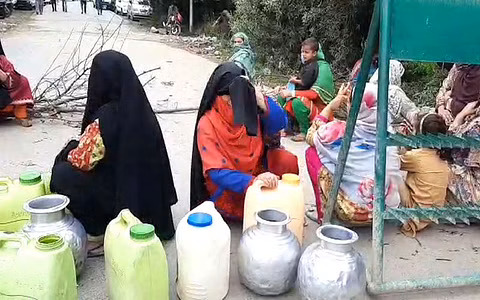High temperatures have led to water levels in rivers and streams across Jammu and Kashmir going down.
Srinagar: Unusual high temperatures with no wet weather conditions in the spring season have brought down the levels of water in all the rivers and streams across Jammu and Kashmir. There has been a looming water crisis in Jammu and Kashmir as the dry weather conditions with all time high temperatures only add to the public woes.
In Jammu, temperatures are touching over 43 degrees with the water crisis becoming acute in many localities, triggering protests. Reports from
Locals from Jammu said that most of the city areas, including the localities coming under the Jammu municipality, are facing acute water shortage in these summer days. Residents from the localities of Jammu city have said that despite their protests, the government has not been able to restore water supply in their localities and in the coming weeks, the situation would be worse.
Reports from hilly districts like Doda, Kishtiwar and Ramban have said that they are facing acute water crises and people have appealed to Lieutenant Governor Manoj Sinha to intervene in this matter. According to the locals of these hilly districts, a majority of the villages are without drinking water facilities, with authorities not streamlining the process.
Reports from the Kashmir valley area are equally gloomy as in the Jhelum River, there is an alarming drop in the water levels, triggering water crisis for irrigation and drinking water crisis in many villages.
Reports from Pulwama and Shopain said that dozens of lift irrigation schemes on the river Jhelum have become defunct and it will force thousands of farmers not to sow paddy this season.
Reports from these villages said that due to the defunct irrigation lift schemes, Director Agriculture and other officials have advised villagers to go for alternative crops, but even those crops need water and villagers wonder where they will get the water from.
“We need irrigation facilities for any crop and receding water levels in the rivers have made our lift irrigation schemes defunct. We will not sow paddy this year,” said Nisar Ahmad Bhat of Awantipora village where the lift irrigation scheme has turned defunct due to very less water level in river Jhelum. The Executive Engineer Irrigation and Flood Control Department has been quoted by local agencies as saying that the water level is receding with each passing day in river Jhelum, triggering crisis both for authorities and farmers.
He said that the present depth of water is as low as 0.6 feet which used to be above 6 feet in June. Due to the less snowfall followed by dry weather conditions in March and April during this year, the water crisis is becoming a huge problem. There has been very little rainfall in the spring season and the dry weather conditions with rising temperature are making the water levels very low in all the streams and rivers of Jammu and Kashmir.
There has been an unusual rise in temperatures with the Jammu region being hit not only by a water crisis, but hundreds of forest fires. In Kashmir valley, all those villages which are dependent on lift irrigation schemes are facing the crisis not only of farming, but drinking water facilities may suffer in the coming months.

